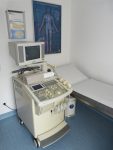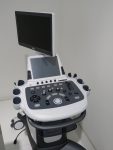
Let us first say a few words about the main duties of diagnostic medical sonographers and then we will further discuss how you can reach this amazing career.
These professionals are well trained to use sound-wave imaging equipment to examine patient bodies with the aim to assess patient health and assist with diagnosing and treating medical conditions.
So as to be allowed to work in this field, you will need to gain a degree or a certificate which are available in numerous educational institutions in the country.
Certificates are available to students who already hold an Associate or Bachelor of Science degree in a health field but wish to become a sonographer.
The length of these programs is generally 18-24 months and graduates of one of the Commission on Accreditation of Allied Health Education Programs (CAAHEP) are eligible to sit for the certification exam with the American Registry for Diagnostic Medical Sonography (ARDMS).
There are also some specialty certificates available to practicing sonographers who are eager to expand their education and career opportunities.
Prior to applying for a certificate program, you should get familiar with entrance requirements, as they may vary, but most programs require students to have completed an Associates’s Degree in allied health.
Page Navigation
Types of Ultrasound Certificates
Various ultrasound certificate programs are offered at schools across the country and they range from introductory ones which are designed to provide students with the essential skills and experience they need to gain employment as an entry-level diagnostic medical sonographer to those more concentrated programs which are considered ideal for people who have already worked in the field but wish to become more specialized.
Here are some examples of ultrasound certificate options:
- Certificate in Diagnostic Medical Sonography is reachable only by gaining skills and experience through both classroom and hands-on teachings in the laboratory and clinical settings. During this program, students will learn ultrasound principles for examining and understanding various body systems including the abdomen, pelvis, breast, and the vascular system. Courses that they will attend are biology, physics, ultrasonography equipment, and patient care. DMS certificate programs take 18-30 months and are available to students who already have a degree in a health field.
- Certificate in Cardiovascular Technology – These professionals use imaging equipment to examine the heart and blood vessel system. Their main duty is to assist doctors with diagnoses and educate their patients on the ultrasound procedures. If you decide to get a certificate in cardiovascular technology you will be taught labs and coursework in biology, health, pathology, medical terminology, and technology along with clinical rotations.
- Advanced Certificate in Cardiac Sonography – this is an ideal program for health care professionals who have previous experience in ultrasound technology or a related field. It is considered perfect for working professionals who want to advance in the field, as course schedules are often part-time or flexible and they can maintain their existing employment. This specialized ultrasound certificate program requires the completion of competency labs or clinical as well as courses in areas of echocardiography, vascular technology, physics, radiologic research, legal/ethics, and more.
- A Supplemental Ultrasound Certificate in Obstetrics & gynecology is designed for people who have previous training and/or experience in sonography and who wish to specialize in OB/GYN ultrasound. The courses students will attend focus on the anatomy and physiology of the female pelvic region and uterus, embryology and fetal development, pathology, sonography protocols, and instrumentation specific to obstetrics and gynecology. It is a mixture of clinical and coursework.
- Pediatric Cardiac Sonography Certificate, also referred to as a Pediatric Echocardiology Technology Certificate is an advanced ultrasound certificate program for experienced sonographers. During this program, students learn how to perform cardiovascular exams and the purpose of these ultrasounds, performed on infants and children, is to diagnose cardiovascular diseases and disorders, such as congenital heart disease, heart murmurs, and Kawasaki disease.
- Point-of-Care Ultrasound (POCUS) – Only registered sonographers are eligible to obtain a POCUS Fundamentals Certificate from the Point-of-Care Ultrasound Certification Academy. It is endorsed by the ARDMS and is available to those interested in getting started in POCUS, or who are in need of CME credits and wish to explore the topic further.
Essential Job Duties
- Communicating with patients and providing reassurance
- Working effectively with people of all backgrounds and abilities
- Standing on your feet most of the day
- Bending over and stooping down regularly
- Assisting patients on and off the examining tables
- Accurately performing the steps necessary in a sonographic procedure
- Lifting at least 50 pounds
- Pushing and pulling without difficulty
FAQs
How long does it take to complete an ultrasound certificate?
The length of your education depends on various factors, such as an ultrasound school you attend and your learning pace.
Ultrasound certificate programs generally take between one to two years to complete, but applicants are expected to already hold an Associate of Bachelors in Science degree in a related field in order to receive a certificate.
Will an ultrasound certificate program qualify me for licensure?
In the majority of cases, a certificate in ultrasound will qualify you to sit for the ARDMS certification exam.
Students who complete a program in diagnostic medical sonography, diagnostic cardiac sonography, vascular technology, or a similar concentration from a CHEA, USDOE, or CMA-accredited school are eligible for the ARDMS exam.
Job Outlook for Ultrasound Technicians
If you invest your time and money in your education, it is expected that you want to find a satisfying job that will provide you with a decent salary.
According to the Bureau of Labor Statistics (BLS), the demand for diagnostic medical sonographers is expected to increase by 19% in the years to come, plus the salary is predicted to be higher than it is now.
The median salary for these professionals is $74,320 a year, with the potential of making over $100,000 a year if you are more experienced and have a higher level of education.
Pre-requisites for admissions into a certificate in the ultrasound program range, depending on the college or university you want to enroll in.
Generally, having your high school diploma/GED to completion of two-year allied health or patient-care related program and/or previous work experience as a Sonographer is necessary so as to be allowed to enroll.








